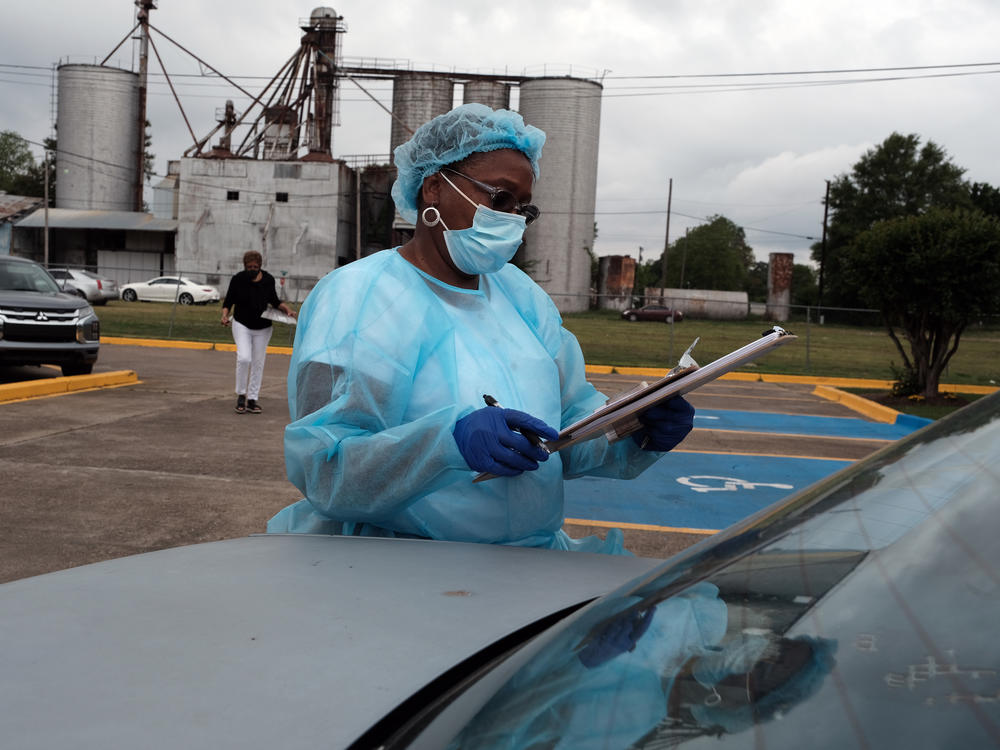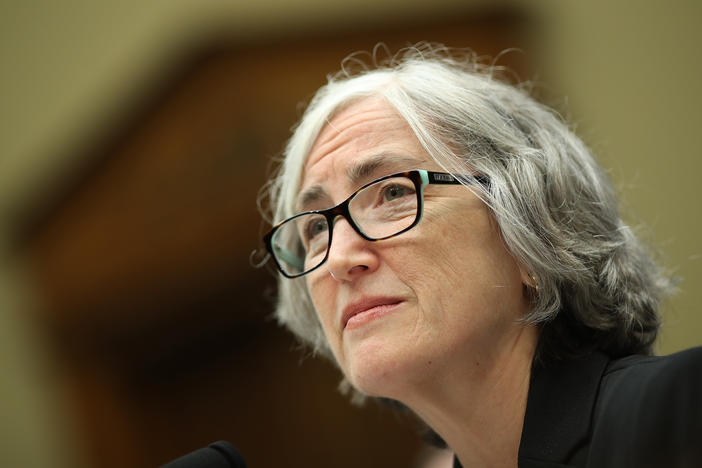Section Branding
Header Content
Why Lagging COVID Vaccine Rate At Rural Hospitals 'Needs To Be Fixed Now'
Primary Content
President Biden on Tuesday is set to announce new steps to reach rural Americans in the push to get as many people as possible vaccinated for the coronavirus, a White House official tells NPR. This emphasis comes as rural hospitals are raising alarms about the pace of vaccination — even among their own employees.
The Biden administration is moving into a new phase of its vaccination campaign, one where it knows doctors and health care professionals are often more persuasive than the government.
It has prioritized a list of doctors enrolled in the vaccine system based on a "social vulnerability index" used by the Centers for Disease Control and Prevention — including doctors in many rural communities — and has been asking state government to send vaccine doses to those doctors, the official said.
The administration also plans to work with states to enroll more pediatricians and family doctors in their vaccine systems so they can begin giving people vaccines, a step that becomes "particularly critical" if the Food and Drug Administration gives emergency authorization for adolescents ages 12-15 to start getting the Pfizer vaccine, the official said.
The administration also is working with provider groups to encourage their members to sign up to give the vaccines and will be providing technical assistance to help practices get ready for vaccination, the official said.
"Tremendously problematic"
The new steps come as some rural hospitals are finding that their own staff members are reluctant to get the shot.
A new survey conducted by the National Rural Health Association and Chartis Center for Rural Health showed that 30% of the 160 rural hospital executives who responded said less than half of their employees had been vaccinated — even though health care workers have been eligible for months now. Only about a third said that 70% or more of their staff were vaccinated.
"These survey results match what we are hearing from our members and that is tremendously problematic," said Alan Morgan, chief executive of the National Rural Health Association.
"At a federal level, every effort to overcome vaccine hesitancy has health care professionals front and center," Morgan said. "So if you've got a quarter of the nation's rural hospitals having less than 50% of their staff vaccinated, you have a problem that needs to be fixed now."
This survey also lines up with a poll done earlier this year by the Kaiser Family Foundation and The Washington Post that found 29% of health care workers in rural areas didn't plan to get the COVID-19 vaccine. That's a greater well of hesitancy than the poll found among health care workers in urban and suburban areas.
Michael Topchik at Chartis said the hospitals they work with have high vaccination rates every year for the flu shot. It's required. "We were surprised at how many rural hospitals were telling us their vaccination rates for COVID-19 were significantly lower," Topchik said.
"It's too early"
In Carrollton, Mo., Jeff Tindle, the chief executive at Carroll County Memorial Hospital, is beside himself about the low rate of vaccination among his staff. Only 59% are vaccinated for COVID-19 and at this point he doesn't have much hope of that number growing dramatically.
Tindle, who describes himself as conservative, like most people in his town, said he had assumed that health care workers would understand the importance of the vaccine. "I'm disappointed that we built in so many safeguards ... first and foremost to protect our employees, and yet we had almost 40% who chose not to help themselves," he said.
The hospital had a vaccine clinic but shut it down, turning its attention to helping the public health department. Most of the people who wanted to get vaccinated in the town of 4,000 have already done so, he said. "We're worried about always wasting vaccine because we just don't have enough arms," he said.
Talking to friends, Tindle says some have told him they are afraid of being implanted with microchips, a false conspiracy theory alive and well on the internet.
"Employees that I talk to, health care employees, will be a little more rational in their irrational behavior by saying, 'Well Jeff, we don't have enough studies. It's too early,' " he said.
"I know that swayed people"
Some rural hospitals have had better luck getting employees vaccinated. Memorial Hospital in New Hampshire's Mount Washington Valley region is currently at 78%. Will Owen, who is running the hospital's community vaccination clinic, said education was key.
In December, a highly respected local physician named Victor Lazaron sent a letter to staff. "I am keen to be vaccinated as soon as possible," Lazaron said in the letter. He cited studies showing vaccines were effective and that the worst side effects were comparable to the vaccine for shingles, which is widely used.
"I hope you all will choose to be vaccinated as soon as the vaccine is available to you. In my judgment it is the best way forward. It is safe and effective. And it will help us get back to our core mission: protecting the health of our friends and neighbors in the Mount Washington Valley," Lazaron wrote.
That letter opened people's minds to the vaccine, Owen said. "I know that [letter] swayed people, because I had people tell me that," he said.
There were also Zoom sessions for staff, led by doctors, leaving plenty of time for questions. Having trusted doctors and nurses vaccinated has been reassuring to others in the broader community, said chief nursing officer Kris Dascoulias, whose roots in the community are so deep that she was born in Memorial Hospital, where she now works.
"I've gotten lots of text messages, questions. I think people relied on the hospital community that they knew and trusted to guide them a little bit in this," Dascoulias said. She said she has encouraged people, telling them, "I know it's a little scary, it's a little bit of a leap of faith, but you know it's better than the alternatives."
White House looks to local doctors
The White House knows that doctors and other trusted local leaders will be the way to break through pockets of hesitancy in rural communities, said Bechara Choucair, the White House vaccinations coordinator.
Choucair also pointed to a different Kaiser Family Foundation poll that found a majority of rural residents had been vaccinated or planned to get vaccinated, although it also shows a much smaller share of urban and suburban residents would "definitely not" get the shot than those in rural areas.
"Luckily we know that the overwhelming majority of health care providers are very supportive of [the] vaccine. Ninety percent of doctors and master's-prepared nurses have either gotten the vaccine or are in the process of getting vaccinated," Choucair told NPR, citing national data about doctors and highly trained nurses.
"We need to do that across the board for health care professionals and non-health care professionals and will continue to do that," he said.
Copyright 2021 NPR. To see more, visit https://www.npr.org.
Bottom Content




